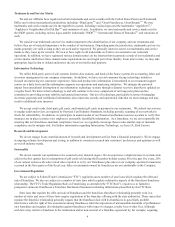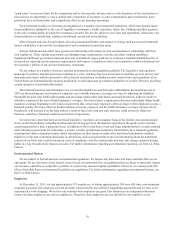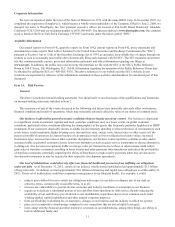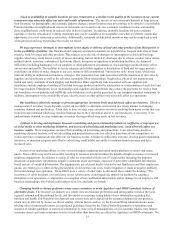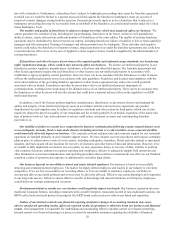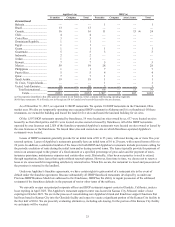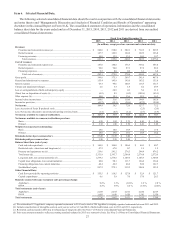IHOP 2015 Annual Report Download - page 38
Download and view the complete annual report
Please find page 38 of the 2015 IHOP annual report below. You can navigate through the pages in the report by either clicking on the pages listed below, or by using the keyword search tool below to find specific information within the annual report.18
Restaurant development plans under development agreements may not be implemented effectively. We rely on franchisees
to develop Applebee's and IHOP restaurants. Restaurant development and the success of restaurants opened by our franchisees
involve substantial risks, including the following:
• the demand for Applebee’s and IHOP restaurants and the selection of appropriate franchisee candidates;
• costs of construction, permit issuance and regulatory compliance;
• the availability of suitable locations and terms for potential development sites, including lease or purchase terms for
new locations;
• the ability of franchisees to fulfill their commitments to build new restaurants in the numbers and the time frames
specified in their development agreements;
• the availability of financing, at acceptable rates and terms, to both franchisees and third-party landlords, for restaurant
development and/or implementation of our business strategy through new remodel programs and other operational
changes;
• delays in obtaining construction permits and in completion of construction;
• developed properties not achieving desired revenue or cash flow levels once opened;
• competition for suitable development sites;
• changes in governmental rules, regulations, and interpretations (including interpretations of the requirements of the
Americans with Disabilities Act); and
• general economic and business conditions.
Approximately 99% of our restaurants are owned and operated by our franchisees and, as a result, we are highly
dependent upon our franchisees. All Applebee’s and nearly all IHOP restaurants are owned and operated by our franchisees.
As a result, we receive less revenue from company restaurant sales than in prior years and any increase in general and
administrative expenses may have a greater proportional impact on our financial condition and business results. While our
franchise agreements are designed to maintain brand consistency, the significant percentage of franchised-operated restaurants
may expose us to risks not otherwise encountered if we maintained ownership and control of the restaurants. If the franchisee
does not successfully operate its restaurants in a manner consistent with our standards, or customers have negative experiences
due to issues with food quality or operational execution, our brand values could suffer, which could have an adverse effect on
our business. Additional risks include franchisee defaults on their obligations to us arising from financial or other difficulties
encountered by them including personal financial risks unrelated to their franchisee activities, such as:
• payments to us or maintenance and improvement obligations;
• limitations on enforcement of franchise obligations due to bankruptcy or insolvency proceedings;
• unwillingness of franchisees to support our marketing programs and strategic initiatives;
• inability to participate in business strategy changes due to financial constraints;
• inability to meet rent obligations on leases on which we retain contingent liability;
• failure to operate restaurants in accordance with required standards;
• failure to meet the criteria for renewing franchise agreements which could have a negative impact on our revenues;
• failure to report sales information accurately;
• efforts by one or more large franchisees or an organized franchise association to cause poor franchise relations; and
• failure to comply with food quality and preparation requirements subjecting us to potential losses even when we are
not legally liable for a franchisee's actions or failure to act.
Although we believe that our current relationships with our franchisees are generally good, there can be no assurance that
we will maintain strong franchisee relationships. Our dependence on franchisees could adversely affect us, our reputation and
our brands, and could adversely affect our business, financial condition and results of operations.
Concentration of Applebee's franchised restaurants in a limited number of franchisees subjects us to greater credit
risk. As of December 31, 2015, Applebee's franchisees operated 1,878 Applebee's restaurants in the United States, representing
100% of the Applebee's restaurants in the United States. Of those restaurants, the ten largest Applebee's franchisees owned
1,345 restaurants, representing 72% of all franchised Applebee's restaurants in the United States. The largest Applebee's
franchisee owned 484 restaurants, representing 26% of all franchised Applebee's restaurants in the United States. The
concentration of franchised restaurants in a limited number of franchisees subjects us to a potentially higher level of credit risk
with respect to such franchisees because their financial obligations to us are greater as compared to those franchisees with
fewer restaurants. The risk associated with these franchisees is also greater where franchisees are the sole or dominant
franchisee for a particular region of the United States, as is the case for most domestic Applebee's franchised territories. In
particular, if any of these franchisees experiences financial or other difficulties, the franchisee may default on its obligations
under multiple franchise agreements including payments to us and the maintenance and improvement of its restaurants. If any
of these franchisees are subject to bankruptcy or insolvency proceedings, a bankruptcy court may prevent the termination of the



